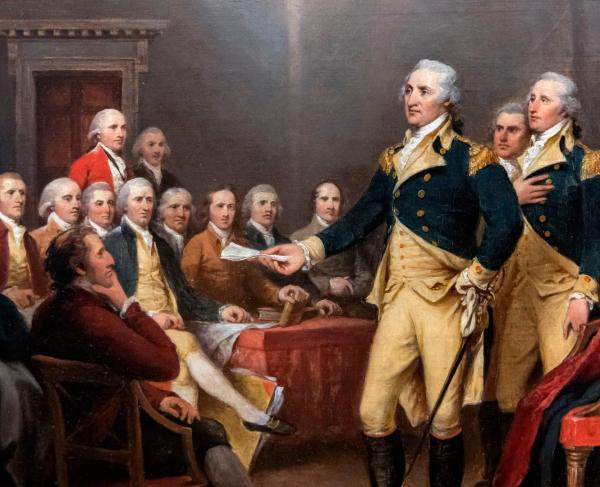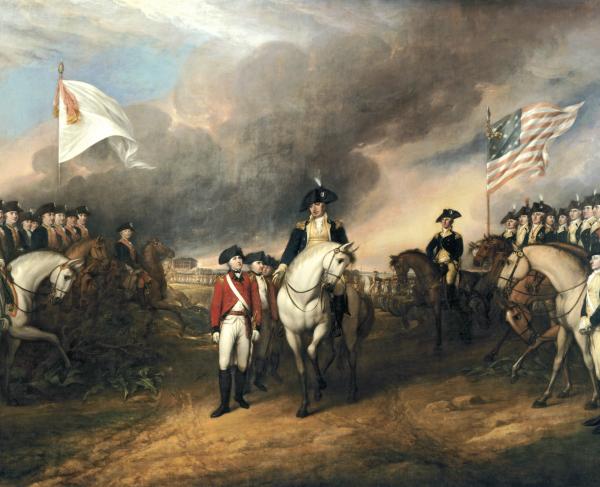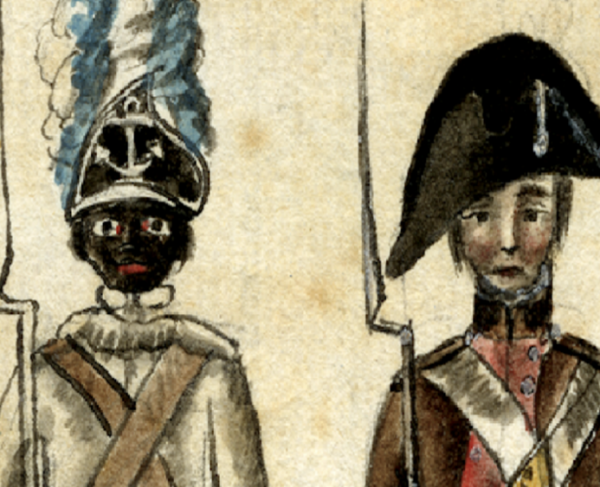Marquis de Lafayette

Gilbert du Motier, Marquis de Lafayette, better known simply as the Marquis de Lafayette, was born into an extremely noble family in Chavaniac, France in 1757. By 1770, he had amassed a large inheritance after the deaths of his mother, father, and grandfather. His wealth and prestige afforded him many opportunities in life, including a commission to the rank of sous-lieutenant in the Musketeers at age 14 and a captaincy in the Dragoons at age 18; the latter he received as a wedding present.
In his youth, Lafayette developed a fascination with the colonial conflict brewing in the Americas. In April of 1777, Lafayette embarked on the Victoire—a ship paid for with his personal funds—for North America desperate to serve as a military leader in the Revolution, despite a royal decree prohibiting French officers from serving in America. Shortly after arriving, the Continental Congress commissioned him a major general and he became a member of George Washington’s staff.
Lafayette participated in his first military engagement at the Battle of Brandywine in September of 1777. He suffered a wound in one of his legs early in the battle but managed to calmly lead a Patriot retreat. Because of his composure and courage at this moment, Washington commended him for “bravery and military ardour” in the battle and recommended him to Congress for the command of a division.
Washington and Lafayette shared a close companionship over the course of the entire war. In fact, Lafayette spent the harsh winter of 1777-78 with Washington and his men at Valley Forge, suffering along with the other Continental soldiers in the frigid, disease-ridden encampment. He helped Washington at his darkest hour when he faced an internal threat from the Conway Cabal, a plot to drive Washington from his command.
Over the course of the next year, Lafayette more intensely pursued the glory he so desperately wanted. The Continental Congress charged him with leading an invasion of Canada. However, Lafayette met with much disappointment upon reaching the launch point at Albany, New York. Continental forces there amounted to less than half the number Congress promised. Disappointed, he returned south, nearly escaping capture by the British that summer at Barren Hill, Pennsylvania and Delaware Bay.
For his skillful retreat from Newport, Rhode Island, Lafayette earned another commendation but this time for “gallantry, skill, and prudence” from the Continental Congress. Lafayette managed to secure leave and returned home to France at the beginning of 1779. Despite receiving a hero’s welcome from the people, King Louis XVI tried and failed to secure his arrest, charging him with disobeying his orders prohibiting French soldiers in America. During Lafayette’s time in France, he played an extremely crucial role in securing 6,000 French troops for the American cause.
Returning to the colonies in 1780, Lafayette’s news of French aid greatly improved American moral. Since his departure, the crucial field of battle had moved to the south. Former Patriot and infamous turncoat, Benedict Arnold, had committed treason and now wreaked havoc on the Virginia countryside as a British commander. Lafayette, in coordination with Baron von Stueben, hunted Arnold, who Washington had condemned to death if captured. By the fall of 1781, the Frenchman found himself at the center of the action and the culmination of a successful war of independence. From the heights of Malvern Hill, Lafayette and his men surrounded the British force at Yorktown, holding them until reinforced by Washington. Together, they initiated the siege that eventually led to the British surrender and an end to the conflict.
For his involvement in both America and Europe, Lafayette has been remembered as “The Hero of the Two Worlds.” After the Revolution, Lafayette returned home to France where he continued to fight for liberty and equality for all mankind, playing a role in the French Revolution. In 1824, he returned to the U.S. for a grand tour in which the people of every city he visited greeted him with cheers and exuberant celebrations.
We can save three remarkable battlefield sites if we can raise $201,500. Every dollar you can donate to this cause will be multiplied by $23.80.
Related Battles
1,300
587
150
75
389
8,589


